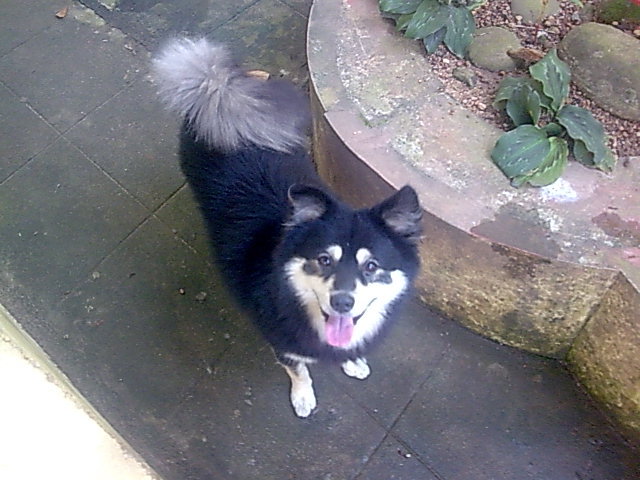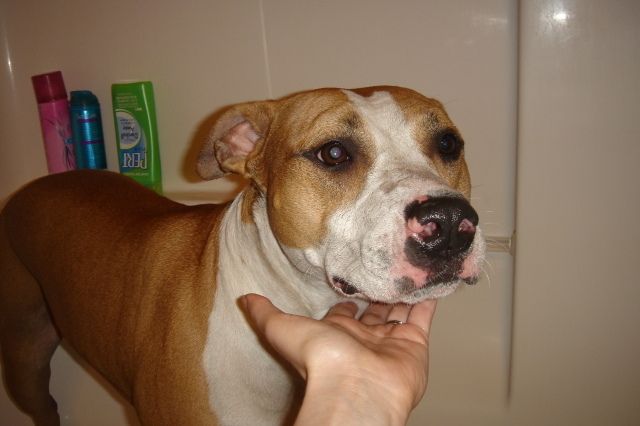QuestionHi and thank you in advance for your time. I have a 9 month English Springer Spaniel who is so rowdy and un-ruly that I am having a hard time trying to train him to do anything. The only thing I have mastered is "sit" which he does very well. Whenever I try to have a training session with him he thinks its just play time and runs around me like an idiot. Help. The major thing he needs to be taught is "come" because he got out of the yard last night and was 2 blocks away before I caught him. Any suggestions?
Thanks, Janet
AnswerTraining a dog takes discipline and consistency on the part of the trainer, more so with some dogs than others. The dogs see all the
people and dogs in the household as a pack with each having their own rank in
the pack and a top dog. Life is much easier if the 2 legged pack members
outrank the 4 legged ones. You can learn to play the role of top dog by
reading some books or going to a good obedience class. A good obedience class
or book is about you being top dog, not about rewarding standard commands with
a treat. Start at http://www.dogsbestfriend.com/
Are you using a training collar? I like to start with heel. If you dog is at least 4 - 5 months old, start with a good 6' leather leash and a sturdy slip collar, the metal chain ones with the rings on each end. You want the shortest one that will go on and off easily. If you walk with the dog on the left, pull the chain through
one loop forming a "P". Facing it, slip it over its head. The free end
should come over the neck to the leash, and the other end should drop slack
when there is no pull on the leash. Before 4 months use a conventional flat
collar to protect the tender young neck.
Easier dogs will give up their pulling with a few good snaps of the leash
combined with a stern "Bad dog!". You can work up to forceful corrections
with the leash doubled up in both hands and your whole body behind it. But
you don't want to use any more force than you need. One gentle technique I
like is to just stop when he pulls. He wants to go. If you move forward when
the leash is slack, and stop when he pulls, he should quickly figure out the
only way to get to go, is not to pull. This is about teaching him not to
pull, not getting somewhere. The man that taught it to me said "If in a half
hour you haven't made it out to the front walk, fine, you have taught him a
lesson.
Still, you may want to switch to a head collar. The leading brands are Promise, Haltie, and Gentle Leader. They have another
strap going around the dogs nose looking something like a muzzle. They work
by pulling the dogs head around. No other way gives you such great control
with so little force. The prong collar is now a dangerous relic of value only
for its macho looks. Do not consider using one without hands on instruction
from somebody with plenty of experience with them.
"Come" needs to be taught as part of proper pack status and obedience.
With the dog at the end of the leash, call its name and "Come" in a firm, but not loud voice. If it comes, praise it lavishly and pet it. If it doesn't come, repeat the command and give the leash a light snap. Keep it up with firmer leash snaps
until the dog does come. Do not forget the praise. Then switch to a longer
leash or rope, about 25'. When it comes well on the longer leash, you should be
able to go to off leash in a fenced area, etc. Once the dog is doing well, introduce come, treat. This is for emergencies only when the dog has gotten loose accidentally. Use it routinely and you will have nothing to fall back on when your dog is headed for a busy street. "Name, come treat!" is little different from the
regular "Name, come!", except the dog gets a great treat when it comes. We are taking a hot dog, cheese, etc. much better than any treat you use routinely.
Relying on come to control most dogs loose outside is risky, and I do not
recommend it. Dogs are individuals. Some can be trained to come when you have
no way to enforce it, but some will never be completely reliable even for the
most experienced trainers.

 Maltipoo skin color
Question
Cooper
Hello, our family recently found
Maltipoo skin color
Question
Cooper
Hello, our family recently found
 pooping and peeing
Question
snoopy
hi, my name is praveen n i have a dog t
pooping and peeing
Question
snoopy
hi, my name is praveen n i have a dog t
 Dog breed?
QuestionQUESTION: Hi Nancy,
I am attaching an image of
Dog breed?
QuestionQUESTION: Hi Nancy,
I am attaching an image of
 Nutrition & Health
Question
Peek-A-Boo!
Hello! I am new to owning small br
Nutrition & Health
Question
Peek-A-Boo!
Hello! I am new to owning small br
 Helpppp
Question
Maddy
I have a 9 month peekapoo. She is pad tr
Helpppp
Question
Maddy
I have a 9 month peekapoo. She is pad tr